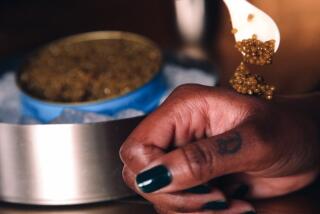Caviar Is for Everyone, Innovator Says
- Share via
CHICAGO — Tradition says caviar comes from sturgeon and the best comes from beluga sturgeon that swim Russia’s salty Caspian Sea. But Carolyn Collins aims to turn such convention on its ear.
Her products hail from the Great Lakes and other North American bodies of water. The roe--eggs still in the ovarian membrane--come from fish such as salmon, trout, freshwater sturgeon and whitefish.
And she sells the market’s only flavored varieties--spiked with chilis and other ingredients--with names such as “Lone Star Caviar” and “Smoked Chicago Golden.”
Collins even promotes using the fish eggs in recipes such as enchiladas con caviar .
Collins wants to change caviar’s reputation as a snack for the snooty set and she doesn’t mind the jokes.
“Caviar ought to be a staple food item for the common household,” she said. “It should not be just a rare occasional treat for the rich and famous because it’s so good and so much fun.”
Her company is among a small group of domestic caviar producers but is the only one that makes flavored varieties, said John Roberts, head of the National Assn. of the Specialty Food Trade in New York.
“People recognize her as a leader and innovator,” he said.
She launched Carolyn Collins Caviar Co. in 1984 after a chef-friend raved about her homemade salmon caviar.
Now Collins’ caviar is available by mail order, in Midwest markets and at numerous restaurants and hotels nationwide. It’s also exported.
At West Point Market in Akron, Ohio, it has sold as well as traditional caviars, said owner Russ Vernon.
“To purists it’s like putting strawberry jam on your brie,” Vernon said of the flavored varieties. “It gives you options beyond beluga to have a little more fun with it and be a little less serious.”
For the first year, Collins made and delivered the caviar herself. As its popularity grew she hired a few assistants, but the factory just west of Chicago’s downtown Loop remains a small operation.
“Caviar is nothing more than cleaned, salted fish eggs. The trick is in the handling and in the technique,” Collins explained. “You have to be very, very careful not to break the berries. You have to keep everything very cold . . . in order to keep the freshness up.”
Collins declined to release earnings figures for her privately held company. But she said sales volume doubled almost every year for the first six years. Business tapered off with the recession, but she still sells about 10,000 pounds of caviar a year.
Collins features traditional styles of caviar. At $25 an ounce and less, they are three times cheaper than top-quality imports.
The flavored varieties--$8 to $12 an ounce--make up about half the business volume.
“All the purists treat us kind of like, ‘Ho, ho, flavored caviars.’ But we sell a lot of it,” she said. “To me that’s the bottom line.”
More to Read
Eat your way across L.A.
Get our weekly Tasting Notes newsletter for reviews, news and more.
You may occasionally receive promotional content from the Los Angeles Times.








